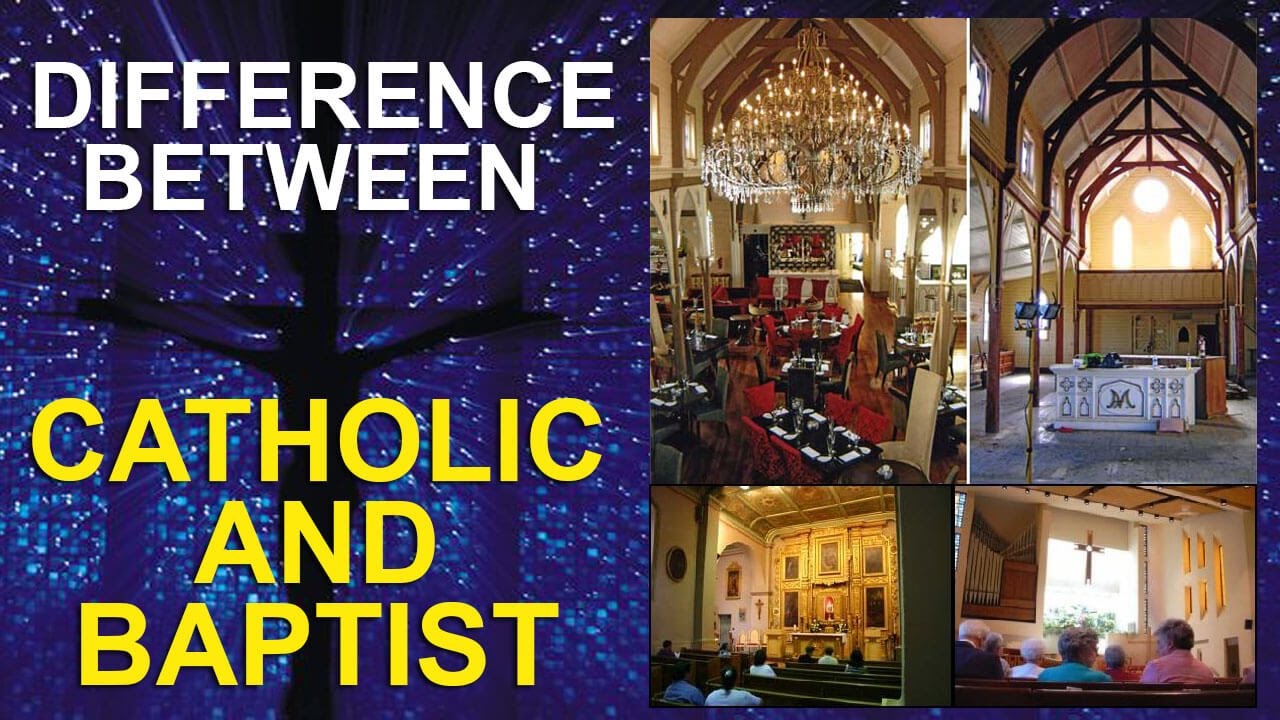Have you ever wondered about the differences between Catholic and Baptist beliefs? If you’re curious, you’re not alone.
Understanding these differences can shed light on how each faith shapes its followers’ lives and worship practices. You might find yourself surprised at how these two branches of Christianity, while both rooted in a love for Christ, diverge in their teachings, traditions, and ways of connecting with God.
By exploring these distinctions, you can gain a deeper insight into the rich tapestry of Christian theology. Dive into this article to uncover the unique aspects of Catholic and Baptist faiths, and discover what makes each one a distinct pathway in the journey of spirituality.

Historical Background
Catholicism and Baptism emerged from different historical roots. Catholicism traces back to early Christianity in Rome, emphasizing tradition and sacraments. Baptists arose during the Protestant Reformation, focusing on individual faith and baptism by full immersion. Each has unique beliefs shaped by their distinct histories.
In understanding the differences between Catholicism and Baptism, diving into their historical background offers valuable insights. The roots of these two branches of Christianity are steeped in rich history, evolving over centuries. By exploring their origins, you can better appreciate the distinctive traditions and beliefs that characterize each.Origins Of Catholicism
Catholicism traces its origins back to the early days of Christianity. Emerging from the teachings of Jesus Christ and his apostles, it was formalized as a religion in the Roman Empire. The Catholic Church claims an unbroken lineage from Saint Peter, who is considered the first Pope. This connection to the apostles is central to Catholic doctrine. You might find it fascinating that the word “Catholic” means “universal.” This reflects the Church’s mission to spread its teachings across the globe.Origins Of Baptism
Baptism, as a denomination, arose much later in Christian history. It emerged during the Protestant Reformation in the 16th century, a time marked by significant religious upheaval. Baptists rejected certain Catholic doctrines, advocating for believer’s baptism. This means individuals should be baptized only when they are old enough to profess faith. Unlike Catholicism, Baptists emphasize a more personal and direct relationship with God. Their congregational style of worship is distinct, often relying on the Bible as the sole authority. Reflecting on these origins, you might wonder how historical contexts shape the beliefs and practices of these faiths. How do these foundational stories influence your understanding of religious identity today?Core Beliefs
Understanding the core beliefs of Catholicism and Baptist traditions illuminates their unique spiritual foundations. Both branches of Christianity share a devotion to Jesus Christ, but their doctrines diverge significantly. These differences shape the practices and communities within each tradition.
Catholic Dogma
Catholicism centers on the teachings of the Pope and the Church. The Bible and Church traditions guide Catholic beliefs. Sacraments like Baptism, Eucharist, and Confirmation are essential. Catholics believe in the Virgin Mary’s role as a mediator. The concept of saints plays a vital part in worship. Catholics follow the authority of the Vatican and the Pope. The Church’s doctrine emphasizes the importance of the Holy Trinity.
Baptist Principles
Baptists prioritize individual faith and personal relationship with God. Baptism is performed by full immersion and symbolizes rebirth. Baptists rely solely on the Bible for guidance. Personal interpretation of scripture is encouraged. Each congregation governs itself independently. Baptists reject hierarchical structures like the Vatican. The focus is on salvation through faith alone. Baptists emphasize the believer’s direct access to God without intermediaries.
Sacraments And Ordinances
Catholics practice sacraments, viewing them as sacred rites imparting grace. Baptists observe ordinances, symbolic acts reflecting faith and obedience. Both honor rituals, yet differ in spiritual interpretation and significance.
Understanding the differences between Catholic and Baptist beliefs can be fascinating, especially when you dive into their practices regarding sacraments and ordinances. These rituals are at the heart of each denomination’s faith expression and provide a unique insight into their spiritual life. Whether you’re a curious individual or someone exploring different faiths, knowing how these traditions shape religious experiences can be eye-opening.Catholic Sacraments
Catholics recognize seven sacraments as essential to their spiritual journey. These sacraments are considered divine channels of grace. They include Baptism, Confirmation, Eucharist, Penance, Anointing of the Sick, Holy Orders, and Matrimony. Each sacrament marks a significant spiritual milestone. For instance, Baptism is not just a symbol; it’s believed to cleanse original sin and initiate one’s journey in faith. The Eucharist, often celebrated weekly, is central to Catholic worship, as believers partake in the body and blood of Christ. Have you ever attended a Catholic Mass and noticed the reverence during communion? This is because Catholics view the Eucharist as more than a symbolic act; it is the real presence of Christ.Baptist Ordinances
Baptists, on the other hand, practice two primary ordinances: Baptism and the Lord’s Supper. These are considered symbolic acts of obedience rather than sacraments. Baptism is performed by full immersion and is a public declaration of faith. It signifies a believer’s personal commitment to follow Christ. If you’ve ever witnessed a Baptist baptism, you might have noticed the joyful celebration that accompanies this important step. The Lord’s Supper, often called Communion, serves as a reminder of Christ’s sacrifice. Unlike Catholics, Baptists view this as a memorial rather than a literal transformation. Are these practices simply traditions, or do they hold deeper meaning? When you participate or observe, how do they impact your understanding of faith? Exploring these differences raises intriguing questions about how rituals influence belief. It might even inspire you to reflect on your own spiritual practices and their significance.
Scriptural Interpretations
Scriptural interpretations form a core part of religious traditions. Catholics and Baptists both cherish the Bible. Their approach to its interpretation differs significantly. These differences shape their beliefs and practices. Understanding these interpretations helps clarify their unique perspectives.
Catholic Bible Interpretation
The Catholic Church follows a rich tradition of biblical interpretation. They rely on both Scripture and Church teachings. The Church believes in a harmonious relationship between them. Catholics see the Bible as inspired by God. But they also rely on the Magisterium. This is the Church’s teaching authority. It helps interpret biblical texts correctly. Tradition plays a vital role. It guides understanding and application of biblical teachings. Catholics often view the Bible allegorically and literally. They emphasize the context and deeper meanings.
Baptist Bible Interpretation
Baptists hold the Bible as the sole authority in faith. They emphasize personal interpretation. Each believer can read and understand Scripture independently. Baptists focus on the literal meaning of the text. They prioritize direct and plain interpretations. They encourage individual study and prayer for guidance. Baptists often avoid allegorical interpretations. Their approach fosters a personal relationship with Scripture. This perspective emphasizes the Bible’s clarity and accessibility.
Church Structure
The church structure is a key difference between Catholic and Baptist faiths. Each denomination has a unique way of organizing and leading its congregations. Understanding these structures helps to appreciate the diversity in Christian practice.
Catholic Hierarchy
Catholic Church follows a hierarchical system. It begins with the Pope at the top. Below him are cardinals and bishops. Each bishop oversees a diocese. Priests manage individual parishes. This structure ensures unity and consistency in teachings.
The Pope is considered the spiritual leader. He guides the worldwide Catholic community. Cardinals assist him and elect new Popes. Bishops have authority over local churches. They interpret and implement church doctrines. Priests conduct daily services and provide pastoral care.
Baptist Congregationalism
Baptist churches operate under congregational governance. Each church is autonomous. There is no central authority. Members have a say in decisions. This includes choosing pastors and managing church affairs.
Church members vote on important issues. They elect leaders and decide financial matters. Pastors lead services and offer spiritual guidance. But major decisions involve the congregation. This system fosters independence and community involvement.
The Baptist structure emphasizes personal faith. It promotes local control and active participation. Each church adapts to its community’s needs. This flexibility attracts people seeking a more direct connection with their faith.
Worship Practices
Catholic worship includes rituals like the Eucharist and prayers to saints. Baptist practices focus on Bible readings and personal faith. Both value community worship but differ in traditions and liturgical elements.
When you attend a religious service, you might notice that worship practices can vary significantly between denominations. This is especially true for Catholics and Baptists. While both are Christian, their approaches to worship hold distinct differences that reflect their unique beliefs and traditions. Understanding these differences can enrich your experience and provide deeper insights into each faith.Catholic Mass
Catholic Mass is a structured and sacred ceremony. It revolves around the Eucharist, which Catholics believe is the real presence of Christ. Mass is divided into distinct parts: the Liturgy of the Word and the Liturgy of the Eucharist. The former includes readings from the Bible, a homily, and prayers. The latter involves the consecration of bread and wine, transforming them into the body and blood of Christ. Participation in Mass includes standing, sitting, kneeling, and responding verbally at different times. This can seem complex to newcomers, but it fosters a sense of unity and reverence. Have you ever been to a Catholic Mass and noticed the peaceful solemnity it brings?Baptist Services
Baptist services tend to be less formal and more flexible. They focus heavily on sermons, which are central to the worship experience. The structure of a Baptist service can vary, but typically includes hymn singing, prayer, and a sermon. Music plays a significant role, often featuring lively gospel songs that encourage active participation. This creates an atmosphere of joy and community. Unlike the Catholic Mass, Baptist services do not involve a Eucharist ritual. Instead, Communion is celebrated less frequently and is viewed as symbolic. Have you experienced the warm, welcoming nature of a Baptist service? Understanding these differences in worship practices can enhance your appreciation for each tradition. Whether you find peace in the solemnity of a Catholic Mass or the joyous community of a Baptist service, each offers a unique path to spiritual fulfillment. Which worship style resonates more with your personal beliefs and experiences?Role Of Tradition
Understanding the role of tradition is essential in differentiating Catholic and Baptist beliefs. Tradition influences how these faiths interpret teachings and practice rituals. Both have unique views on the importance of tradition within their religious practices.
Catholic Tradition
Catholicism places a high value on tradition. It sees tradition as a vital link to the teachings of Jesus and the apostles. Tradition and scripture are viewed as equal sources of divine truth. Catholics believe that tradition helps preserve the faith’s integrity over time. Rituals, sacraments, and church authority are deeply rooted in tradition. These elements guide Catholic beliefs and worship practices.
The Catholic Church maintains a structured hierarchy. This hierarchy supports the transmission of traditions. The Pope and bishops play key roles in interpreting traditions. They ensure continuity of teachings across generations. Tradition is seen as a living process. It evolves while maintaining core principles.
Baptist Scriptural Focus
Baptists emphasize the importance of scripture. They prioritize the Bible as the ultimate authority. Tradition is considered less essential compared to scripture. Baptists often view tradition with caution, fearing it may overshadow biblical teachings. They prefer a direct relationship with scripture.
Baptist worship practices focus on personal interpretation of the Bible. There is less reliance on established rituals. Baptists value individual connection with God through scripture. Church practices are often simple and scripture-centered. This approach encourages active participation and personal faith development.
While tradition exists within Baptist communities, it does not dictate beliefs. Each congregation may develop its own practices. Flexibility in tradition allows for diverse expressions of faith. Baptists strive to align their lives closely with biblical teachings.

Views On Salvation
Salvation is a core belief in Christianity. It defines how believers attain eternal life. Catholics and Baptists have unique views on salvation. Understanding these differences sheds light on their faith practices. Let’s explore how each tradition perceives salvation.
Catholic Salvation
Catholics believe salvation is a lifelong journey. It begins with baptism. This sacrament cleanses original sin. Catholics emphasize faith and good works. Both are necessary for salvation. The Church teaches that grace is essential. It is received through sacraments like communion and confession. Catholics also believe in purgatory. A place where souls are purified before heaven. This belief underscores the importance of prayers for the dead.
Baptist Salvation
Baptists hold a different view. They emphasize personal faith in Jesus. Baptists believe salvation is a one-time event. It occurs when a person accepts Christ. This act is often called being “born again.” Baptists focus on the Bible as the sole authority. They stress that good works follow salvation. Not as a requirement, but as evidence of faith. Baptists reject the concept of purgatory. They believe in direct entry to heaven after death.
Frequently Asked Questions
What Are Core Beliefs Of Catholics?
Catholics believe in the Trinity, sacraments, and the Pope’s authority. They emphasize tradition and the Eucharist’s significance. The Virgin Mary holds a special place. Salvation is through faith and good works. Catholics follow the teachings of the Bible and Church.
How Do Baptists View Baptism?
Baptists practice believer’s baptism by full immersion. They believe baptism symbolizes faith, not salvation. It is a public declaration of faith in Jesus Christ. Baptists emphasize personal choice and reject infant baptism. Their focus is on individual commitment to faith.
Do Catholics And Baptists Have Different Worship Styles?
Yes, Catholics have structured liturgical services with rituals and sacraments. Baptists prefer informal worship with hymns and sermons. Catholic services often include the Eucharist, while Baptist services focus on Bible teaching. Each denomination has unique traditions in worship.
What Role Does Tradition Play In Catholicism?
Tradition is vital in Catholicism, guiding beliefs and practices. It complements the Bible and is preserved by the Church. Sacred traditions include rituals, teachings, and doctrines. Catholics see tradition as a way to understand and interpret their faith.
Conclusion
Catholics and Baptists share a Christian foundation but differ in practices. Catholics follow traditions like the sacraments and have a hierarchical structure. Baptists emphasize individual faith and baptism by immersion. Both value scripture but interpret it differently. These distinctions shape their worship and community life.
Understanding these differences enriches our appreciation of Christian diversity. Exploring both can deepen one’s faith journey. Each offers unique insights into spirituality and community. Through this knowledge, respect and dialogue can grow among believers.

I’m someone who’s always been fascinated by how small differences can lead to big understanding. That’s why I love writing “What’s the difference between…” content; it helps me explore topics from multiple angles and explain them in a clear, practical way. Whether it’s tech, productivity, business, or everyday decisions, I enjoy making complex ideas easier to compare, understand, and act on.










